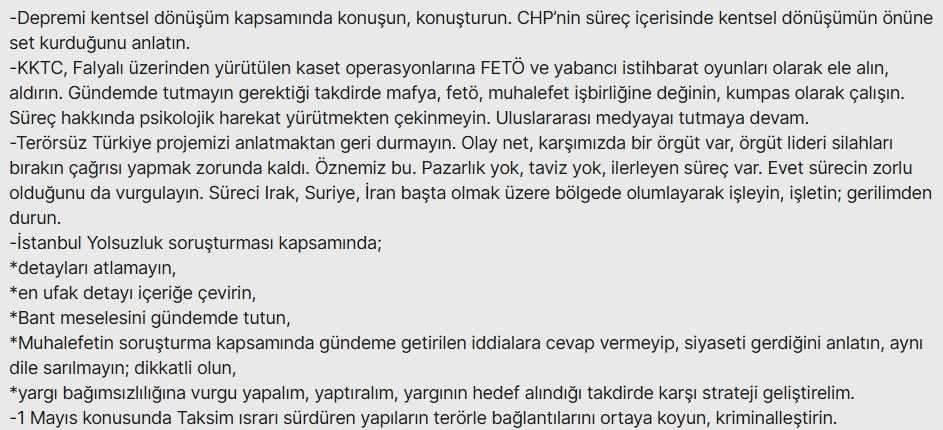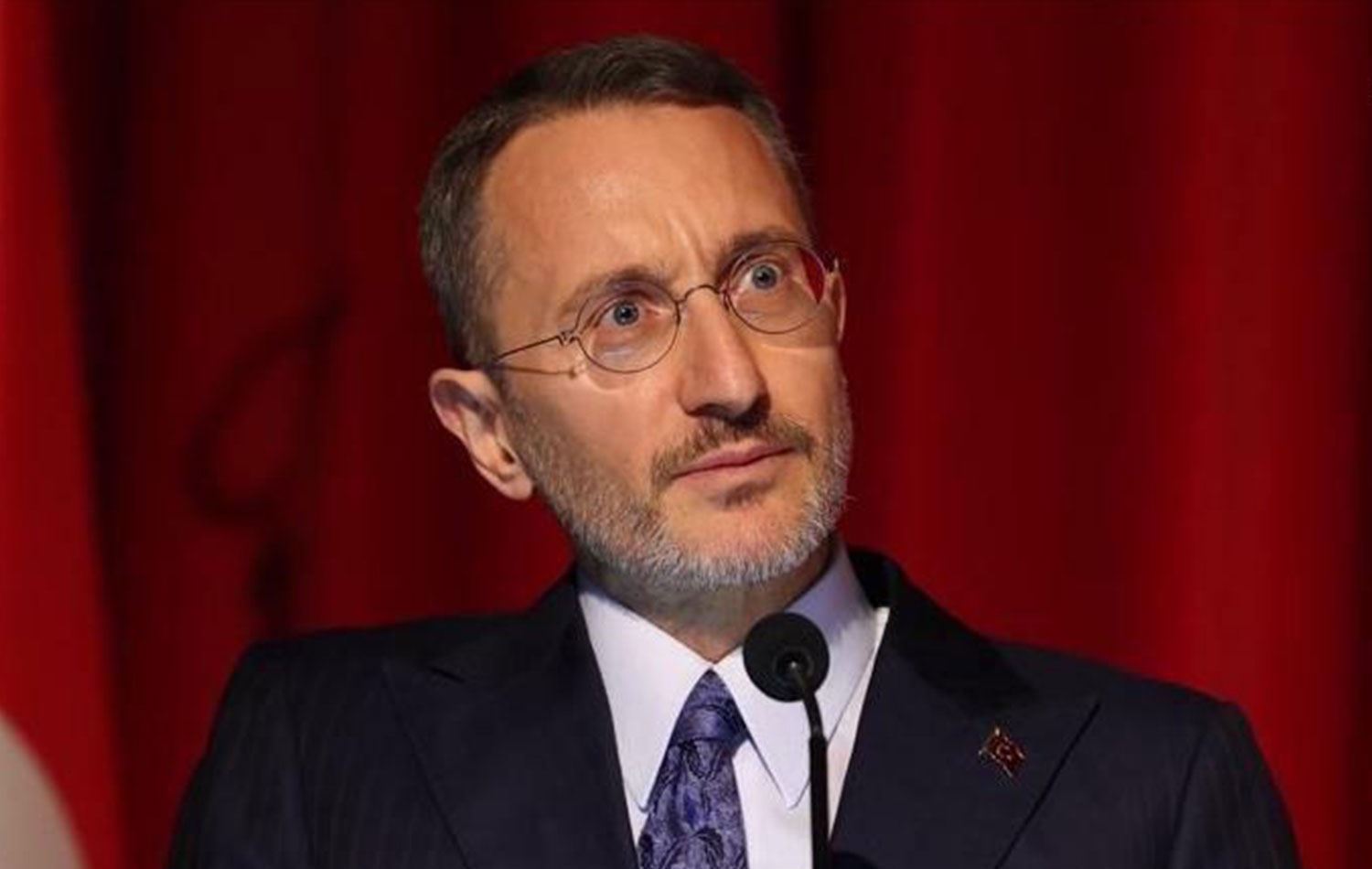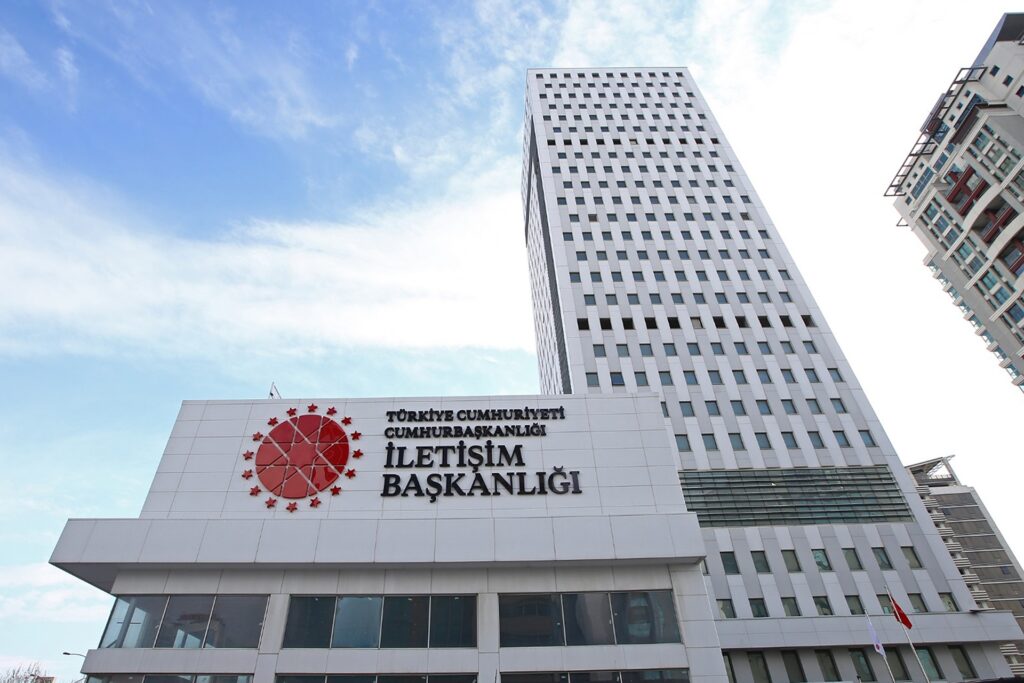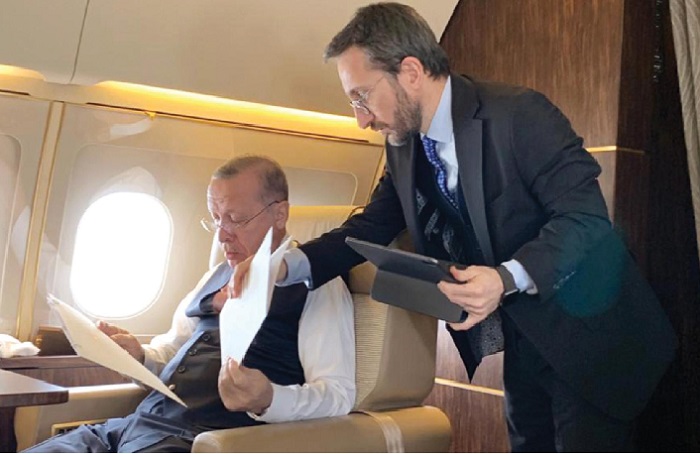Levent Kenez / Stockholm
A leaked directive from Turkey’s Directorate of Communications, often referred to as President Recep Tayyip Erdogan’s propaganda arm, has revealed coordinated psychological operations aimed at manipulating public perception of recent scandals involving the Turkish government and Erdogan’s inner circle. The document, allegedly authored by Communications Director Fahrettin Altun, instructs pro-government lawmakers, media outlets and commentators on how to frame damaging developments as foreign plots and smear campaigns by opposition groups.
The internal memo, which came to light after it was cited by Republican People’s Party (CHP) leader Özgur Özel in a speech on April 30 and later leaked to Turkish media, includes talking points and narrative strategies to counter widespread reports of corruption, organized crime links and abuse of state power.
One of the most explosive revelations in the directive is the instruction to frame recent claims involving mafia-linked businessman Halil Falyalı, who was murdered in northern Cyprus in 2022, as part of a campaign by foreign intelligence agencies and the Gülen movement, a group critical of Erdogan. The scandal, which has rocked Ankara in recent weeks, includes allegations that former interior minister Süleyman Soylu and former vice president Fuat Oktay accepted millions in bribes and that compromising tapes involving Erdogan’s son Burak and Erkam Yildirim, son of former prime minister Binali Yıldırım, exist.

Revelations made by Cemil Önal, an accountant who worked for the Falyalı family between 2014 and 2021 and played a key role in establishing a large-scale money laundering scheme for illicit funds, were first raised by the main opposition party on April 15. Main opposition leader Özel claimed that Falyalı and his associates had moved large sums of money to launder through Cyprus, Turkey and the United Kingdom with the assistance of Turkish government officials.
Önal’s allegations suggest that President Erdogan and his family members have facilitated the laundering of illicit funds from drug trafficking and illegal online betting operations based in Turkish-controlled northern Cyprus.
Önal also alleged that Falyalı had accumulated numerous sex tapes of government officials and politicians, filmed in his hotels in Cyprus, which featured intimate acts.
According to reports published in the Dutch media on the afternoon of May 1, Cemil Önal was shot and killed in the bar of the hotel where he was staying in The Hague. While Dutch police have yet to release an official statement, sources familiar with the incident have confirmed that the victim was indeed Önal.

In response, Altun instructed government allies to present the allegations as part of a “foreign intelligence operation,” linking them to the Gülen movement, which the Erdogan government designates as a terrorist organization.
“Do not keep this in the spotlight. Don’t hesitate to conduct psychological operations. Keep it associated with the international media,” Altun wrote, according to screenshots of the memo circulated to media outlets.
The leaked communication also includes talking points on other domestic issues. Following a strong earthquake that hit Istanbul last week, Altun’s note urged framing the natural disaster as a chance for urban transformation, crediting the ruling Justice and Development Party (AKP) with new housing initiatives and blaming the CHP for allegedly resisting urban renewal efforts.
The memo also references the March 19 detention and subsequent arrest of Istanbul Mayor Ekrem Imamoglu and dozens of municipal officials, a move widely viewed as a political maneuver to weaken Erdogan’s most formidable rival ahead of future elections. Surveys have shown the public sees the arrests as a politically motivated effort to eliminate a rising opposition figure.

Altun directed allies to emphasize the “illegality and corruption” of the Imamoglu administration while downplaying the political context of the arrests. “Don’t echo opposition language. Portray them as evading responsibility and escalating tensions,” the memo says.
The document also recommends branding labor organizations planning to mark May Day in Istanbul’s Taksim Square as “terrorists” in a move human rights groups have condemned as authoritarian. Despite the square’s symbolic value for labor movements and Turkey’s short-lived efforts to liberalize its use in the early 2010s, the Erdogan government has long since restricted political gatherings there, especially after the 2013 Gezi Park protests.
The directive urges criminalizing the groups insisting on protesting in Taksim and encourages media figures to link these organizations to violent extremist groups, a tactic frequently employed in Turkish media coverage of opposition activities.
The leaked memorandum also includes directives on shaping narratives around Turkey’s judiciary and the Kurdish political movement. It instructs government-aligned voices to frequently emphasize the independence of the judiciary amid growing accusations of political interference in legal processes. In addition the memo provides guidance on how to report on developments involving Kurdish politicians and the outlawed Kurdistan Workers’ Party (PKK).
Altun has not denied the memo’s authenticity. In a post on X, he accused opposition leader Özel of “not recognizing the state” and implied that his instructions were consistent with his official duties.
“We, together with all our colleagues, will continue to fight for the truth. You cannot intimidate us, you cannot silence us,” Altun wrote.
The revelations come amid increased scrutiny of the Directorate of Communications’ rapidly growing budget, staff and influence. Created in 2018 and tasked officially with promoting Turkey’s international image and combating disinformation, the agency has come under fire for functioning more like a partisan propaganda ministry.

At a 2025 budget session in Parliament on November 29, 2024, Vice President Cevdet Yilmaz claimed the directorate exists to “strengthen communication between the government and citizens” and to “promote Turkey’s perspectives globally.” However, opposition lawmakers have criticized its actual operations, citing massive increases in spending and staff as evidence of its political utility to the Erdogan regime.
From a budget of 344 million Turkish lira (approximately $9.9 million) in 2019, the directorate’s funding ballooned to a proposed 6.1 billion lira (about $175 million) for 2025, a nearly 16-fold increase. Its workforce also surged from 584 employees in 2018 to more than 1,600 as of late 2024. Lawmakers say the institution now commands more funds than 157 other public bodies including those tied to national defense, science and education.
The directorate also benefits from the government’s discretionary funds, which are not reflected in its official budget.
Altun himself has become a lightning rod for criticism. Frequently dubbed Turkey’s “media commissar,” he is said to oversee editorial content in pro-government outlets, coordinate talking points across TV networks and even pre-approve questions posed to Erdogan during public appearances. At a nation branding forum in 2022, Altun declared that “Turkey’s most powerful brand is Erdogan himself,” reinforcing accusations that the directorate’s true mission is image management rather than public service.
Altun’s ties to Erdogan are not only ideological but also financially lucrative. He sits on the board of the Istanbul Stock Exchange and is a trustee of Manas University in Kyrgyzstan. His wife, Fatmanur Altun, an academic at Marmara University, also serves on the board of Turkish Airlines and previously led TURGEV, a foundation widely believed to be controlled by Erdogan’s family.

Adding to the controversy, the directorate’s current headquarters were once a dormitory built for female university students by charitable donations from businessman Akın İpek, now living in exile. After the government seized his assets, the building was reassigned first to ministries and eventually to the Communications Directorate. İpek had resisted pressure to make his media outlets adopt a pro-government editorial line and had refused to pay bribes to Erdogan.
Meanwhile, Ipek’s 79-year-old mother was arrested on November 9, 2024, in what critics describe as a continuation of the government’s campaign of political retribution.












